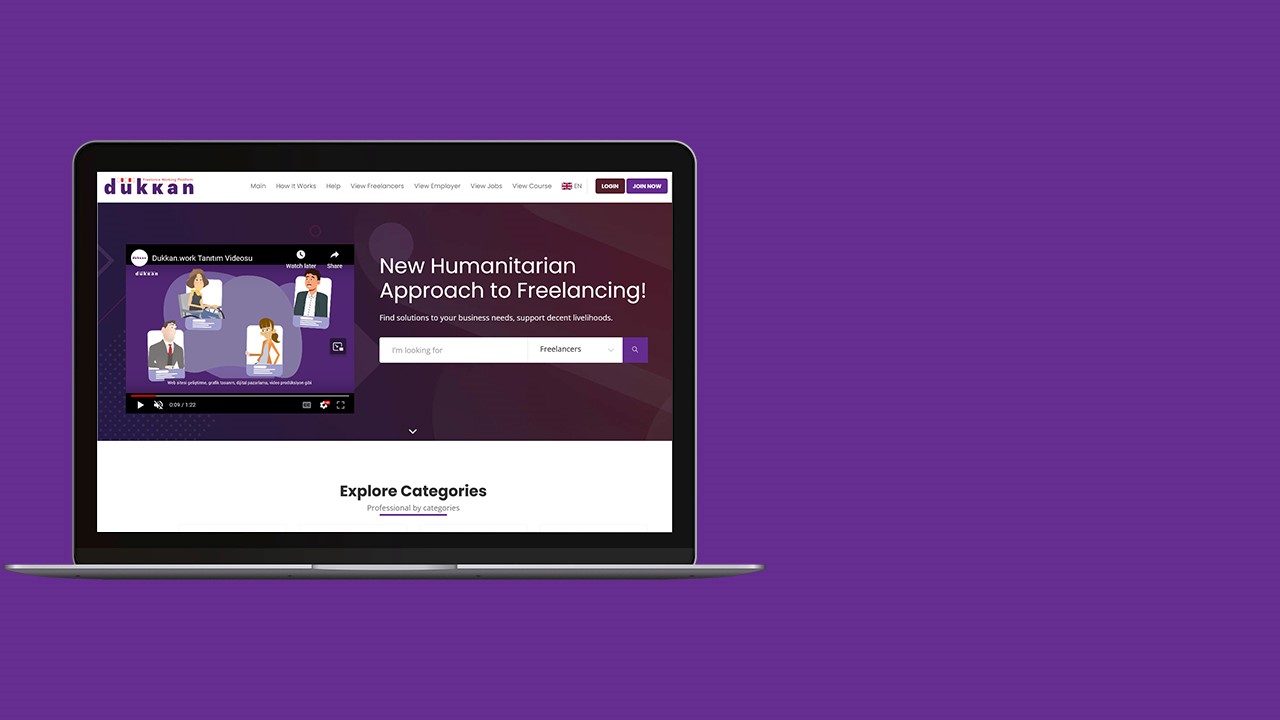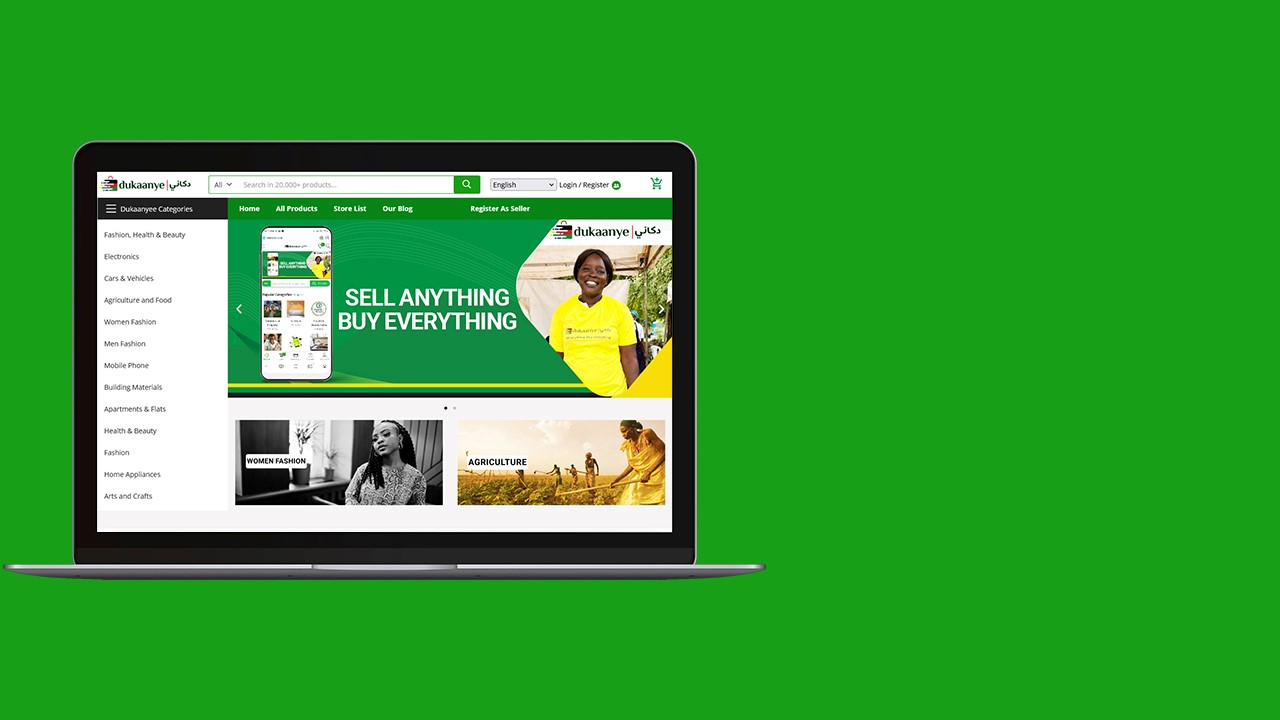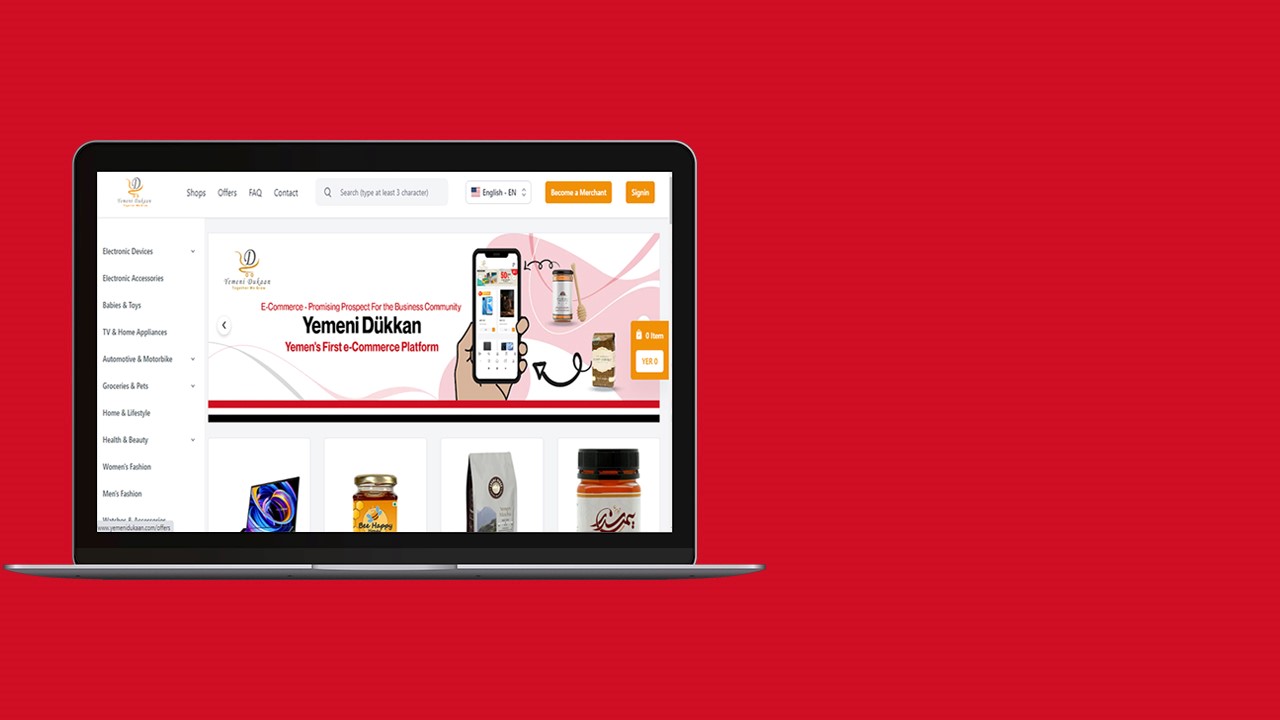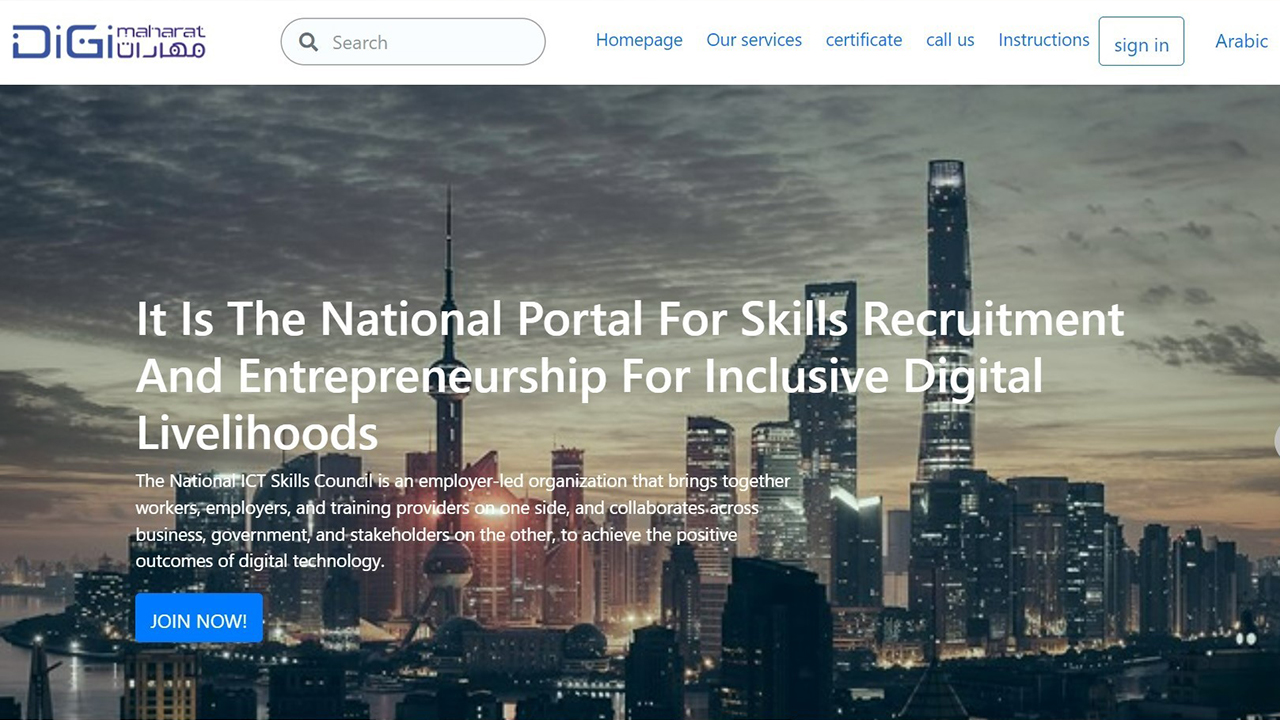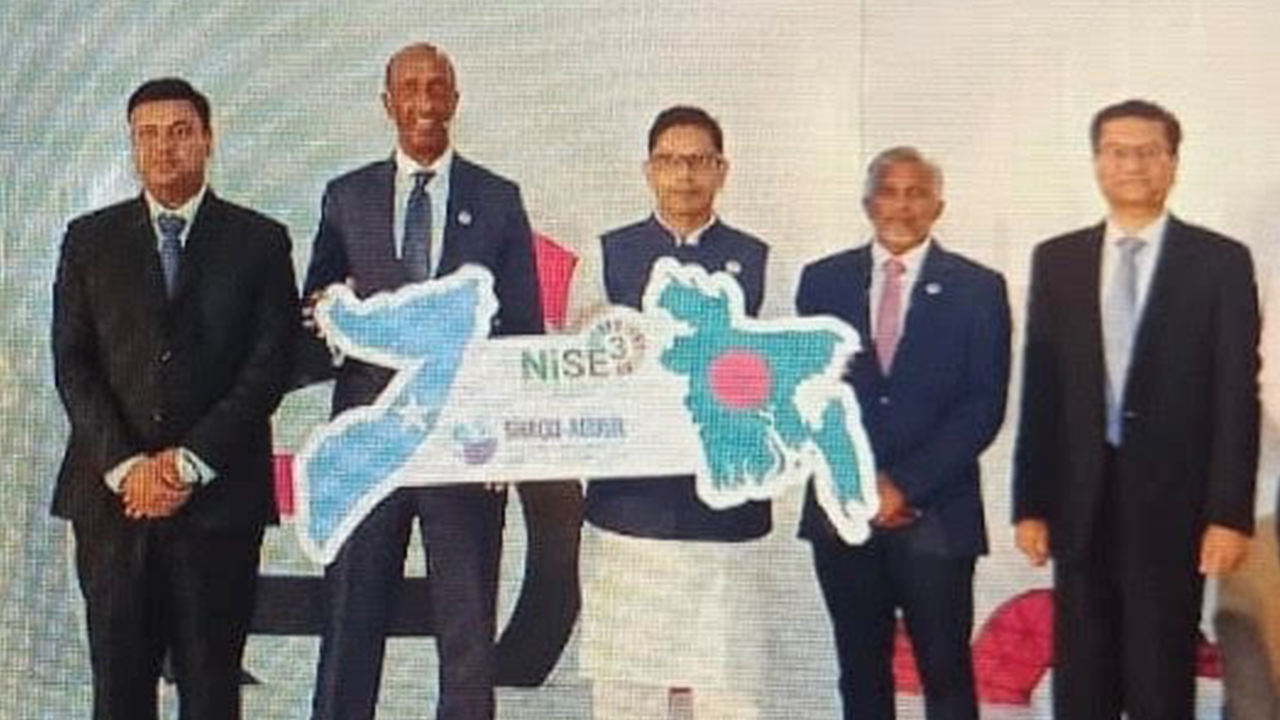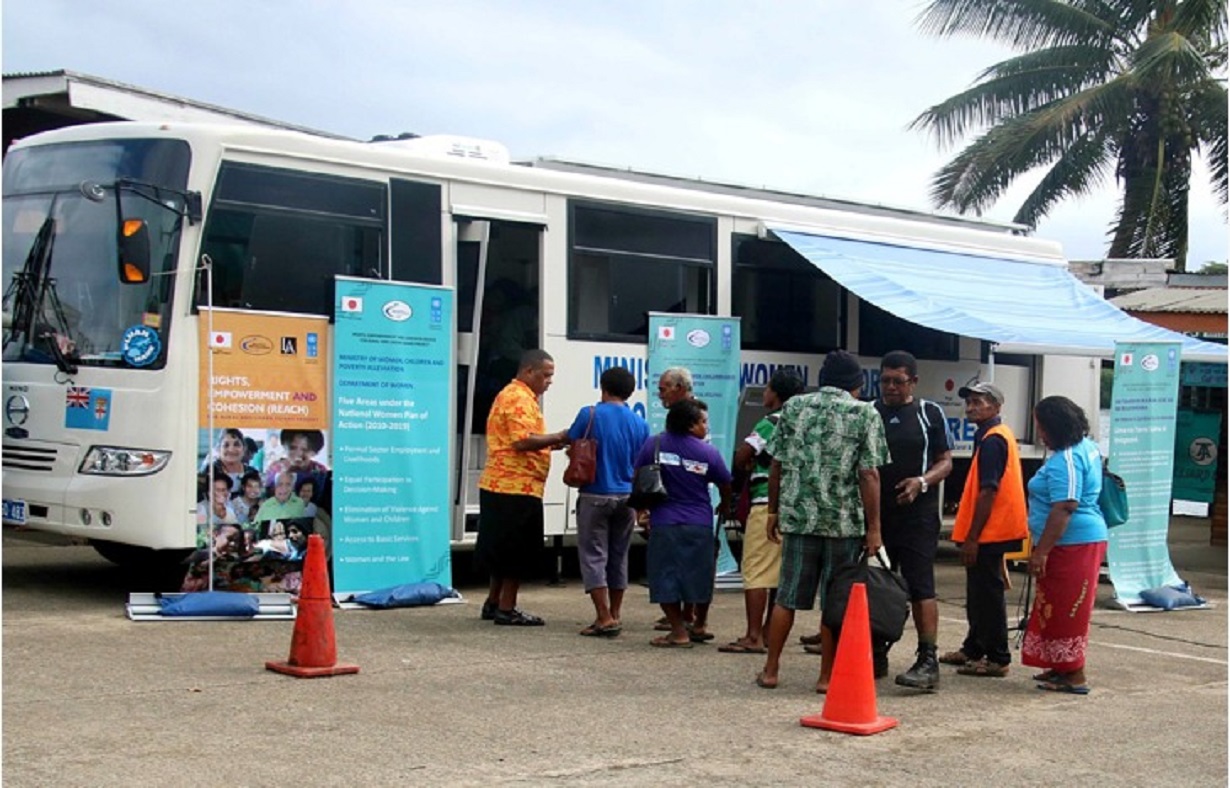TECH TRANSFER
Global Transfer of
Inclusive Innovations
Implemented by UNDP Turkey, UNDP Bangladesh, and a2i replicating the much successful and widely recognized integrated virtual marketplace model of the ekShop DPG, the Dükkan freelance working platform was developed within the “COVID-19 Resilience and Response Project” funded by the Government of Japan, with the technical support of the Migrant Nation Foundation. Officially launched on June 24, 2021 Dükkan is a unique, aggregated single-point freelance working platform solution connecting supply and demand sides. Its aim was to create and facilitate digital livelihoods opportunities to the refugees with Arabic literacy and basic and advanced computer skills.
The single platform can tap into many freelancing sites and aggregate works relevant to the refugees thus giving them a chance to participate. The platform is serving as a catalyst for the Syrian refugees’ livelihood and take down most of the barriers faced by them to work and earn. On the other hand, it has been creating new jobs for the Turkish citizens to collaborate and earn by managing the work. The widely used payment gateways guarantee safe, secure, and easy payment both for companies and freelancers. Syrian freelancers living in Turkey are encouraged to join Dukkan to provide digital services in their area of expertise.
The national e-Commerce backbone of Bangladesh – ekShop DPG of a2i is replicated as Dukaanye.com in South Sudan as its first digital marketplace, with the support of the government of South Sudan, UNDP, the African Development Bank, the Kingdom of Netherlands, and the implementing local partner. On 12th August 2022, H.E Rebecca Nyandeng De Mabior, Vice President for the Gender and Youth Cluster of the Republic of South Sudan, launched Dukaanye.com.
Its ongoing capacity development initiatives such as training and mentoring for entrepreneurs and assisting them to start their business on the platform has empowered thousands of marginalized entrepreneurs with access to knowledge, technology, and skills.
Bangladesh’s established assisted, integrated rural e-Commerce model of ekShop DPG has been successfully replicated in Yemen, as Yemeni Dükkan, which is the first e-Commerce platform of the country and a business-to-business (B2B) and business-to-customer (B2C) platform. Developed by the UNDP Yemen, a2i, UNDP Bangladesh and the Yemeni private sector, the platform provides virtual marketplace solutions for the local MSMEs based in urban, semi-rural, and rural areas. As informal micro and SME sector contributes a lot towards the economy, this replication initiative is expected to contribute as a centralized platform by creating awareness of e-Commerce among the small entrepreneurs, to access wider markets in home and abroad as well as a logistical and payments connectivity to provide the needed stability and boost to the sector.
Yemeni Dükkan hopes to help the local micro, small, and medium entrepreneurs and private sector personnels to understand & implement the necessary e-Commerce strategies and best practices as well as overcome the challenges of accessing local markets, which would help build their livelihoods and generate decent income while strengthening their resilience to shocks and crises.
In line with a shared commitment to advancing e-governance and capacity development, and in alignment with the vision for creating a digital Bangsamoro Autonomous Region for Muslim Mindanao (BARMM), UNDP Philippines initiated a five-year project with the Ministry of Interior and Local Government (MILG) called LeAPS (Localizing e-Government for Accelerated Provision of Service). This project involves replicating several initiatives from Bangladesh's a2i Programme in BARMM, with valuable support from a2i, for efficient public service delivery and digital infrastructure in the region.
myGov (a digital Government service aggregation platform of Bangladesh) has been replicated in BARMM where a2i has been providing knowledge and advisory support in collaboration with UNDP Philippines and Ministry of Interior and Local Government. The initiative aims to reduce TCV (time, cost and number of visit) of citizens by developing a centralized digital platform in the BARRM. It also aims to increase access to information among citizen achieving greater productive capacity and good governance at all levels.
On 11th November 2021, the replication of myGov platform was launched in Dhaka, Bangladesh by the H. E. Naguib Sinarimbo, Minister, Ministry of Interior and Local Government and the Hon’ble ICT State Minister of Bangladesh H.E Zunaid Ahmed Palak at the sidelines of the World Congress on Information Technology (WCIT) 2021.
Hashemite Kingdom of Jordan, like most other developing nations, faces youth unemployment, limited job opportunities, and challenges integrating Syrian refugees. The government aims to address these issues for economic stability. Syrian refugees in Jordan face employment challenges due to legal restrictions and limited job opportunities. A digital job platform is essential to connect them with potential employers, offering a lifeline for financial stability and self-sufficiency while mitigating the hardships of displacement.
This put in motion a collaboration among a2i Programme of Bangladesh, UNDP Jordan and Ministry of Digital Economy & Entrepreneurship (MoDEE), Jordan to develop a digital platform to enable the Syrian refugees with skills development and employment opportunities. a2i Programme’s National Intelligent for Skills, Education, Employment, and Entrepreneurship (NISE) platform was customized based on the requirement of the target communities locally known as Digi Maharat in Arabic language. The UNDP Crisis Bureau, NY, provided technical support for the piloting phase, and a2i provided knowledge and advisory support. Through joint collaboration of a2i, UNDP Bangladesh, MoDEE and UNDP Jordan; the portal is witnessing further development.
Somalia is home to the youngest population in Africa. 75 percent of the population is under the age of 30, with a youth unemployment rate (14 to 29) of 67 percent—one of the highest rates in the world. Women, internally displaced persons (IDPs) and returnees are the most vulnerable communities impacted by the COVID-19 pandemic. In addition, in Somalia, the informal economy dominates and recruiting and hiring practices are not transparent. To combat these issues and promote inclusivity, Somali policymakers have turned to digital platforms as a solution. These platforms break down barriers to employment, particularly for young people and vulnerable communities, and offer a more resilient response to socioeconomic challenges, especially in the context of the pandemic.
Somalia's collaboration with Bangladesh, which faces similar youth unemployment issues, led to the replication of Bangladesh's successful National Intelligence for Skills, Education, Employment, and Entrepreneurship (NISE) initiative. This matchmaking platform connects unemployed youth, skills service providers, and industries, bridging the skills gap and expanding access to quality job opportunities. This replication was a joint effort where a2i from Government of Bangladesh provided knowledge and advisory support, UNDP Chief Digital Office provided technical support and Ministry of Communications & Technology (MoCT), Somalia and UNDP Somalia implemented the project.
On 11th November 2021, the replication of NISE platform was launched in Dhaka, Bangladesh by the Hon’ble Minister, Ministry of Communications & Technology (MoCT) of Somalia H.E Abdi Sheikh Ahmed and the Hon’ble ICT State Minister of Bangladesh H.E Zunaid Ahmed Palak at the sidelines of the World Congress on Information Technology (WCIT) 2021. Currently, the MoCT, Federal Republic of Somalia, is piloting the NISE platform in Somalia with a locally known as “Shaqo Abuur”.
Fiji embarked on an e-governance transformation journey, harnessing technology to enhance government services, foster transparency, and engage citizens. The primary goal was to streamline administrative processes and improve public access to information and services. In pursuit of this goal, the Ministry of Women, Children, and Poverty Alleviation of Fiji collaborated with UNDP Fiji and the a2i Programme of Bangladesh to replicate a2i's successful initiative in Fiji.
This initiative, known as the "Start-to-Finish (S2F) Service Delivery Tracker," was specifically designed to monitor applications to the Ministry's Poverty Benefit Scheme (PBS). With support from the UNDP Pacific Office in Fiji's REACH project, the S2F Service Tracker System was operationalized in the Ministry of Women, Children, and Poverty Alleviation. a2i Programme supported in simplifying and designing this system, contributing to Fiji's ongoing efforts to modernize its public service delivery and improve the lives of its citizens.


